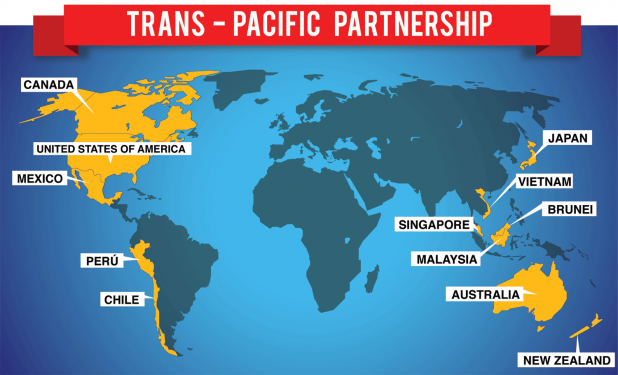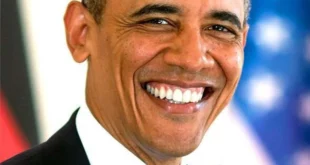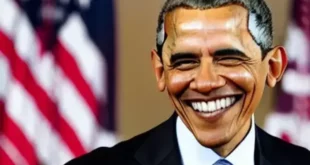James Kirkpatrick
VDARE
June 20, 2015
While everyone was focused on the shooting in South Carolina, the Republican House went ahead and handed Obama the greatest legislative victory of his term.
The U.S. House passed President Barack Obama’s fast-track trade bill, one of the president’s top second-term priorities, with mostly Republican votes a week after a Democratic rebellion almost killed the proposal.
The 218-208 House vote Thursday returns the measure to the Senate, which also voted for it last month. Obama wants the expedited trade negotiating authority to help his administration complete a 12-nation Trans-Pacific Partnership.
Twenty-eight Democrats, including Representatives Debbie Wasserman Schultz of Florida and Terri Sewell of Alabama, voted for the measure. And 50 Republicans, including Representatives Chris Collins of New York and Daniel Webster of Florida, voted against it.
“This is a vote for a stronger economy and higher wages. This is a vote for our system of free enterprise. This is a vote for American leadership,” said House Ways and Means Committee Chairman Paul Ryan, a Wisconsin Republican, on the floor before the vote.
[Obama’s Fast-Track Trade Bill Passes House in Second Attempt, by Carter Dougherty and Bill House, Bloomberg, June 18, 2015]
Again, it’s important to remember that as far as anyone can tell, this is the sole piece of substantial legislation the Republican Party has passed since its great victory in the 2014 midterm elections. That victory was entirely driven by the strategy of “we are not President Obama.”
Then, once in power, the Republicans refused to oppose Obama’s unilateral Amnesty/Immigration Surge and instead spent an incredible amount of political capital to hand the President a victory and spit in the face of their own base. This decision also makes it all but inevitable the white working class, which the Republican Party desperately needs in order to win elections, will stay home in 2016.
Meanwhile, according to a new poll, Scott Walker has emerged has the favorite among Republican conservatives.
Wisconsin Governor Scott Walker is the clear favorite of conservative voters as he readies an expected bid for the Republican Party’s presidential nomination in 2016, according to a Reuters/Ipsos poll.
Walker and Texas Senator Ted Cruz can each claim about a quarter of the most conservative party members, the poll shows. While ardent conservatives only account for 1 in 10 Republican voters, they are more likely to vote in primary contests and take an active role in politics. He also wins a large share of conservative-leaning voters who are less inclined to see every issue in terms of black and white.
Overall, 11 percent of Republicans say Walker is their pick to be the party’s nominee for the November 2016 election, putting him in third place behind former Florida Governor Jeb Bush and former Arkansas Governor Mike Huckabee.
[Scott Walker leads among Republican conservatives, poll shows, by Andy Sullivan, Huffington Post, June 18, 2015]
However, as the article notes, many voters are “projecting” what they want to see on Scott Walker. And what policy stance has Walker taken recently?
Despite staying largely silent on the issue—he’s quietly supported it for weeks, but hasn’t said anything at all in quite a long time—Wisconsin Gov. Scott Walker crossed most conservatives by coming out in support of Obamatrade [last] Thursday in an interview with Bloomberg’s Mark Halperin.
Walker, Bloomberg’s Halperin and John McCormick wrote, “expressed agreement with President Barack Obama on the pressing issue of fast-track trade legislation.”
“Walker said he supports giving Obama the authority to submit trade agreements to Congress for an expedited, up-or-down vote without amendments,” they wrote, before quoting Walker himself.
“If we don’t go down this path, we’re going to be at a competitive disadvantage, and so I think it just makes sense,” Walker said.
[Scott Walker pushes Obamacare on eve of vote, by Matthew Boyle, Breitbart, June 11, 2015]
This will make it very hard for Walker to pose as a kind of populist, Midwestern champion of American workers. It also undermines his otherwise strong immigration stance. Finally, considering how conservative opposition to TPP has picked up in recent weeks, it may fatally weaken his position as the conservative leader.
As of now, there really is no opposition party in Washington DC, except for the grouping around Senator Jeff Sessions. Time for a third party? Time for Donald Trump for President? Just about anything seems preferable to business as usual.
But then, it isn’t quite over yet. Obamatrade still has to go before the Senate. We will see what happens in the days to come.
 Daily Stormer The Most Censored Publication in History
Daily Stormer The Most Censored Publication in History



